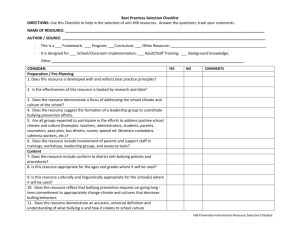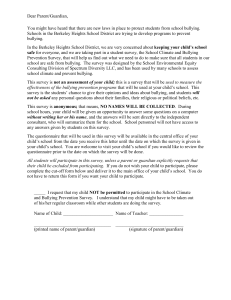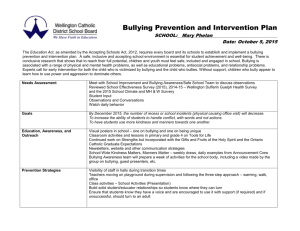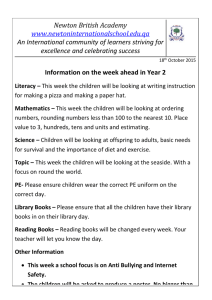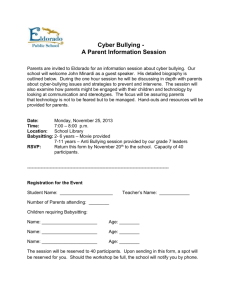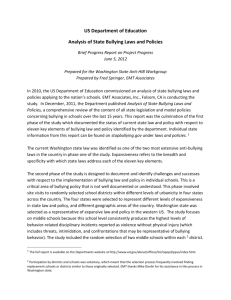PBS Parents Website on Bullying
advertisement
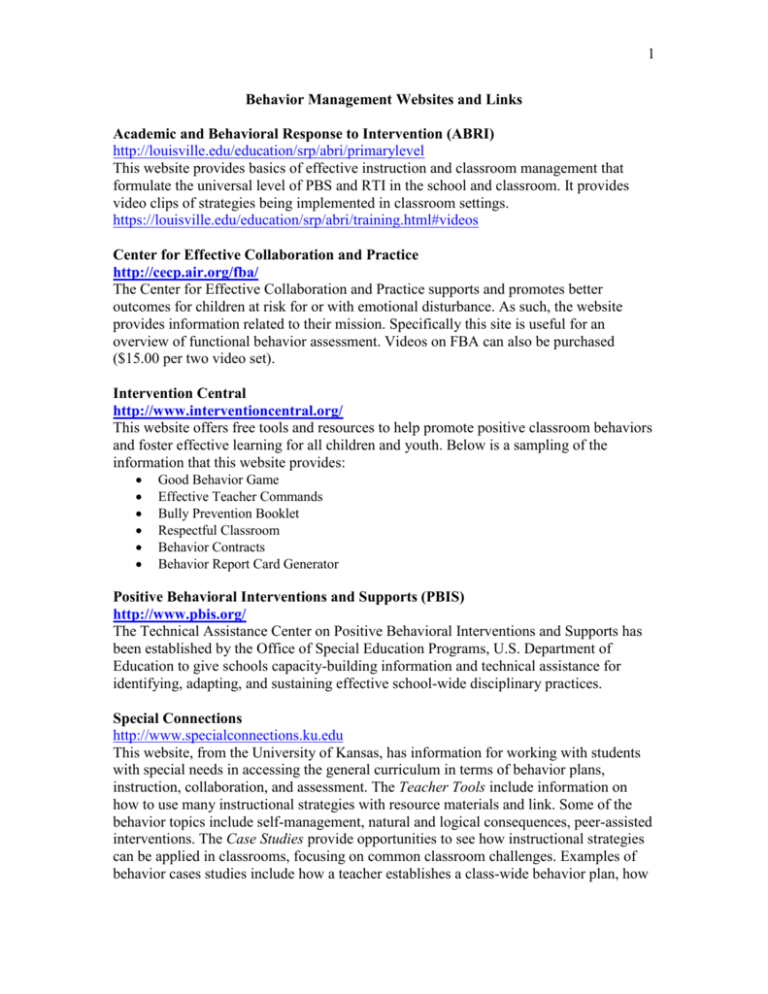
1 Behavior Management Websites and Links Academic and Behavioral Response to Intervention (ABRI) http://louisville.edu/education/srp/abri/primarylevel This website provides basics of effective instruction and classroom management that formulate the universal level of PBS and RTI in the school and classroom. It provides video clips of strategies being implemented in classroom settings. https://louisville.edu/education/srp/abri/training.html#videos Center for Effective Collaboration and Practice http://cecp.air.org/fba/ The Center for Effective Collaboration and Practice supports and promotes better outcomes for children at risk for or with emotional disturbance. As such, the website provides information related to their mission. Specifically this site is useful for an overview of functional behavior assessment. Videos on FBA can also be purchased ($15.00 per two video set). Intervention Central http://www.interventioncentral.org/ This website offers free tools and resources to help promote positive classroom behaviors and foster effective learning for all children and youth. Below is a sampling of the information that this website provides: Good Behavior Game Effective Teacher Commands Bully Prevention Booklet Respectful Classroom Behavior Contracts Behavior Report Card Generator Positive Behavioral Interventions and Supports (PBIS) http://www.pbis.org/ The Technical Assistance Center on Positive Behavioral Interventions and Supports has been established by the Office of Special Education Programs, U.S. Department of Education to give schools capacity-building information and technical assistance for identifying, adapting, and sustaining effective school-wide disciplinary practices. Special Connections http://www.specialconnections.ku.edu This website, from the University of Kansas, has information for working with students with special needs in accessing the general curriculum in terms of behavior plans, instruction, collaboration, and assessment. The Teacher Tools include information on how to use many instructional strategies with resource materials and link. Some of the behavior topics include self-management, natural and logical consequences, peer-assisted interventions. The Case Studies provide opportunities to see how instructional strategies can be applied in classrooms, focusing on common classroom challenges. Examples of behavior cases studies include how a teacher establishes a class-wide behavior plan, how 2 a general education teacher works with a team to complete a functional behavior assessment, and how temper tantrums are decreased in a child with autism. The IRIS Center http://iris.peabody.vanderbilt.edu The IRIS Center offers interactive modules, case studies, and activities to provide research-validated information on working with students with disabilities. For information on behavior, a sampling of IRIS content includes the following. When you land on the home page, click on the green Resources link. Modules You’re in Charge! Developing Your Own Comprehensive Behavior Management Plan http://iris.peabody.vanderbilt.edu/par2/chalcycle.htm This module neatly complements the first behavior module, encouraging students to create and print rules and procedures for their own classrooms based on the PAR model. SOS: Helping Students Become Independent Learners http://iris.peabody.vanderbilt.edu/sr/chalcycle.htm This module describes how teachers can help students stay on task by learning to regulate their behavior. The four strategies discussed are self-monitoring, self-instruction, goal-setting, and selfreinforcement. Functional Behavioral Assessment: Identifying the Reasons for Problem Behavior and Developing a Behavior Plan http://iris.peabody.vanderbilt.edu/fba/chalcycle.htm This module explores the basic principles of behavior and the importance of discovering the reasons that students engage in problem behavior. The steps to conducting a functional behavioral assessment and developing a behavior plan are described. Addressing Disruptive and Noncompliant Behaviors (Part 1): Understanding the ActingOut Cycle http://iris.peabody.vanderbilt.edu/bi1/chalcycle.htm The first in a two-part series, this module discusses problem behavior in terms of the stages of the acting-out cycle and suggests ways to respond to students in the cycle's different phases. Addressing Disruptive and Noncompliance Behaviors (Part 2): Behavioral Interventions http://iris.peabody.vanderbilt.edu/bi2/chalcycle.htm The second in a two-part series, this module describes interventions that can increase initial compliance to teacher requests as well as interventions that can be implemented to decrease disruptive and noncompliant behaviors. Case Studies with STAR (Strategies and Resources) Sheets Encouraging Appropriate Behavior: This case study unit outlines positive behavior management techniques that can be employed with individual students who have behavioral concerns that are not effectively addressed by comprehensive classroom rules. Fostering Student Accountability for Classroom Work: Through realistic classroom scenarios, this case study set introduces five key components of an effective accountability system and offers guidance on how to implement these strategies in a classroom setting. Measuring Behavior: This case study unit provides information on how to collect observational data on student behavior. Methods introduced include event, interval, duration, and latency recording. Norms and Expectations: This case study set provides scenarios and strategies that focus on the 3 establishment of classroom norms and expectations through the development of rules and procedures. Online Game The Behavior Game In this interactive game, you categorize consequences as positive, negative, or inappropriate and then arrange the negative consequences into a hierarchy. Info Briefs: Multiple information briefs on topics such as Positive Behavior Support and Functional Behavior Assessment Utah State Office of Education: Least Restrictive Behavioral Interventions (LRBI) http://www.usu.edu/teachall/text/behavior/LRBI.htm This website contains information on the implementation of multiple research-validated behavioral strategies and interventions. It provides definitions, step-by-step procedures, elementary, middle, and secondary examples, implementation information, and supplemental resources. Many interventions also have an on-line video that expands the text material. Social Skills Training Commercial Curriculum First Step to Success https://firststeptosuccess.sri.com/ Grades 1-3; students with externalizing concerns Incredible Years http://www.incredibleyears.com/ Social Skills Improvement System (SSIS) http://www.pearsonassessments.com/pai/ca/RelatedInfo/SSISOverview.htm Early elementary; Upper elementary/middle Second Step (Committee for Children) http://www.cfchildren.org/programs/ssp/overview/ Pre-K through middle school Skillstreaming http://www.skillstreaming.com/ Early Childhood – Adolescent Strong Teens (Brookes) http://strongkids.uoregon.edu/strongteens.html Secondary 4 Bullying Olweus Bullying Prevention Program created by Clemson University http://www.clemson.edu/olweus/ Steps to Respect: A Bullying Prevention Program http://www.cfchildren.org/programs/str/overview/ PBS Parents Website on Bullying http://www.pbs.org/parents/itsmylife/resources/bullies.html CNN’s Resources for Parents and Teachers http://articles.cnn.com/2010-09-30/us/antibullying.resource_1_cyberbullyinganti-bullying-resources-behavior?_s=PM:US Walk a Mile In their Shoes (PDF Document on Bullying and Children with Special Needs) http://www.abilitypath.org/areas-of-development/learning-schools/bullying/articles/walk-a-mile-in-their-shoes.pdf Bullying Resources from the National Criminal Justice Reference Service https://www.ncjrs.gov/App/Topics/Topic.aspx?Topicid=152 National School Safety Center http://www.schoolsafety.us/ Stop Bullying Now (kids website) http://www.stopbullyingnow.hrsa.gov/kids/ Striving to Reduce Youth Violence Everywhere http://www.safeyouth.gov/Pages/Home.aspx Lesson Plans and Strategies for Teachers http://www.educationworld.com/a_special/bully.shtml Bullying and Cyberbullying Modules http://www.bobsedulinks.com/teachers.htm Teacher’s First Bullying and Cyberbullying Resources http://www.teachersfirst.com/spectopics/bullyingandcyberbullyingprevention. cfm No Bully Teacher Resources http://www.nobully.com/teachers.htm PDF Resource: Bullying in Schools and What You Can Do About It http://www.sacsc.ca/PDF%20files/Resources/Bullying%20in%20schools%20 A%20teachers%20guide.pdf National Bullying Prevention Center http://www.pacer.org/bullying/sap/ Antibullying Campaign Resources for Teachers http://www.antibullyingcampaign.ie/


